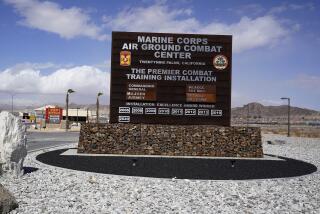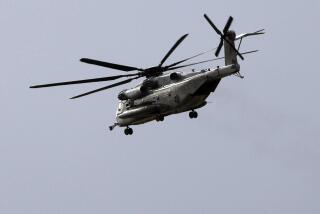Night Patrols in Mogadishu Questioned : Somalia: U.S. Marines mourn death of a second comrade and wonder if they are being unwisely exposed to gunmen.
- Share via
MOGADISHU, Somalia — Marines here Tuesday again mourned a comrade cut down by gunfire and argued over whether the dangerous practice of conducting foot patrols by night through the streets of this war-ruined city makes any sense.
“They see us, we don’t see them,” objected Lance Cpl. Noel Garcia, 22, of Rock Falls, Ill., speaking of Somali snipers. “By the time we’ve seen them, they’ve locked and loaded. No--they’ve fired.”
Lance Cpl. Anthony D. Botello, 21, whose hometown of Wilburton, Okla., praised him as one of its finest young men, died in a Swedish field hospital shortly before 1 a.m. after being hit twice by a Somali gunman Monday night.
He was the second Marine killed on night patrol since American forces landed here Dec. 9. Two other Marines and a Navy corpsman have been wounded. One U.S. Army civilian employee died in a land mine explosion.
U.S. military spokesman Lt. Col. Steve Ritter said the slain Marine was walking on patrol west of the stadium in northern Mogadishu at 11:15 p.m. Monday when he and his squad heard voices. When they moved to investigate, a gunman atop a one-story building began shooting. The Marines returned fire and believe they hit the sniper, because he dropped, Ritter said. The wounded Marine was taken to the hospital, where he died.
The circumstances of the incident showed how difficult it may be to set precise limits for the role of the American military force in Somalia. “We don’t see our mission as a police-type mission; we are here on a humanitarian mission,” Ritter said.
When pressed, he said night patrols are designed to “make the countryside, the highways” safe for moving food to Somalia’s famine-stricken population. But he acknowledged that such shipments usually take place by day.
Night patrols also may head for known trouble spots or neighborhoods where sniper fire has originated, Ritter said.
Botello’s death, and other recent incidents in Mogadishu and the southern port of Kismayu, reinforced a feeling among some here that security has deteriorated.
As Ritter conducted a regular 5:30 p.m. briefing for the press, gunshots sounded in the heavily traveled road outside the grounds of the U.S. Embassy. “I am not going to tell you that Mogadishu is a benign environment,” Ritter told reporters. “But I think that we are making it secure for relief.”
Marine enlisted men say patrols after dark through neighborhoods of Mogadishu that resemble a battered no-man’s-land are hair-raising experiences even for experienced troops, with a backdrop of gutted and burned-out buildings providing cover for an ambush.
“It’s really weird out there at night. There are real tall buildings, where you’ve got to worry about multiple angles of fire. Going down some of those alleys gets to be kind of scary,” said Cpl. James Evans, 21, of Lebanon, Tenn.
As he sat in a trench guarding the ruins of the U.S. Embassy with three antitank missiles, Cpl. Sean Brogan of Dedham, Mass., mused of patrolling: “It’s definitely nerve-racking. Every time you turn the corner, it can be an ambush. It’s just constant high stress.”
Thirty times a day, Marines prowl Mogadishu in Humvees, tanks or on foot in squads of 14 or 15. At night, they spread out about 30 feet apart, because to bunch up would give an attacker with a rifle or grenade a big silhouette at which to aim.
Marines carry M-16s and wear flak jackets and helmets; each of three fire teams has a night scope and night vision glasses. Before they leave on their rounds, which can last an hour or two, they are given warnings by their commander. “Mogadishu is not Disneyland,” is how the soft-spoken Garcia summed up the lecture.
Despite their anxieties and the loss of two Marines in Mogadishu, both Evans and Brogan, artillerymen with the 3rd Battalion, 11th Marine Regiment of Twentynine Palms, said there is no real alternative to the patrols. “We’ve got to show the Somalis that we’re able to use force if we have to,” said Brogan, who has been out at night four times. “It’s a necessary evil.”
Garcia was one of the doubters.
“We came here on a humanitarian mission, not to fight a battle,” he said in an interview inside the soccer stadium, where 1,000 Marines have erected makeshift quarters under the grandstands. “We’re done with our mission. There is only so much we can do to help these people out.”
Some Marines said they believe that hostile Somalis have learned to anticipate their movements and may even have a map showing their positions around the Somali capital. A Marine perched atop a massive amphibious assault vehicle that stands guard in the middle of a major street here told a reporter he felt like a “sitting duck” for snipers.
Asked if the Marine’s death would bring a change in American policy, Ritter said that “at this point, we are not changing the way that we do business” but emphasized that squads going out on patrol are briefed on how to act.
Whatever the cause, the death of a colleague was sobering news. “All the men are down about it,” Garcia said. “It’s a real loss. How can they have these patrols?”
In Botello’s hometown in rural eastern Oklahoma, Ramona Allen, who was his business teacher, said he helped launch career fairs at the school four years ago when he was president of the local chapter of Future Business Leaders of America, the Associated Press reported from Wilburton.
“It is a kind of legacy that Anthony has left us,” Allen said. “I was proud of Anthony. He was a fine young man.”
Mike Hainzinger, his high school football coach, said, “Whatever he did, he wanted to excel at it.”
Botello is survived by his wife, Sharla, his mother, Carolyn Gean, his father, Michael D. Botello, a brother and a sister.
Also Tuesday, 300 Marines of the 3rd Battalion, 9th Marine Regiment, left Somalia to return to Camp Pendleton, making their battalion the first U.S. unit to be replaced by forces from another coalition member--in this case, Australia.
More to Read
Sign up for Essential California
The most important California stories and recommendations in your inbox every morning.
You may occasionally receive promotional content from the Los Angeles Times.













